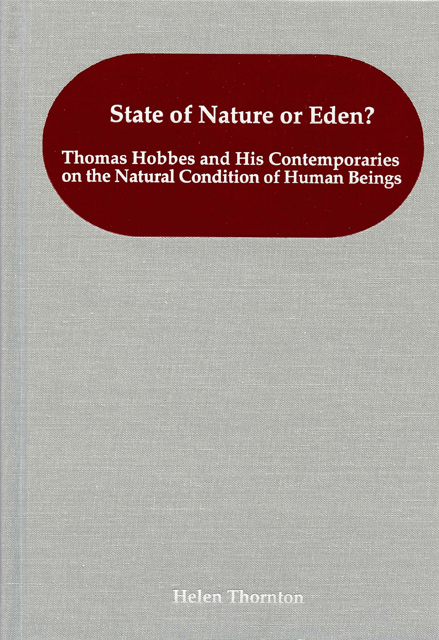 State of Nature or Eden?
State of Nature or Eden? Chapter Five - The Creation of Society
Published online by Cambridge University Press: 21 June 2023
Summary
And Cain went out from the presence of the LORD, and dwelt in the land of Nod, on the east of Eden. And Cain knew his wife; and she conceived, and bare Enoch: and he builded a city, and called the name of the city, after the name of his son, Enoch’. (Genesis IV.16–17)
HOBBES ON THE ESCAPE FROM THE STATE OF NATURE
Although Hobbes thought that human beings were naturally unsociable, he also thought that they sought out the company of other individuals, and they did so for a number of mainly selfish reasons: to satisfy basic physical, sexual, or emotional need; or in order to have other individuals to compare themselves with. According to Hobbes, experience of what individuals did when they met each other demonstrated that ‘every voluntary encounter is a product either of mutual need or of the pursuit of glory’. And from this it followed that all ‘society, therefore exists for the sake of either advantage or of glory, i.e. it is a product of love of self, not love of friends’. But for Hobbes, ‘no large or lasting society, can be based upon the passion for glory’ because ‘glorying, like honour is nothing if everybody has it’.
If glory could not be the origin of lasting society, what was? According to Hobbes, human beings sought out other people, and could increase the advantages of this life by doing so, but ‘this is much more effectively achieved by Dominion than by their help’. It was the desire for dominion, which was natural, rather than society. Individuals would rather seek dominion over others, than ally with them. But there was one thing that led individuals to society, rather than dominion, and that was fear of the harm other men might do to them, particularly if that harm resulted in their death. In ‘the absence of fear, men would be more avidly attracted to domination than to society’. Therefore it was mutual fear, which was the ‘origin of large and lasting societies’.
- Type
- Chapter
- Information
- State of Nature or Eden?Thomas Hobbes and his Contemporaries on the Natural Condition of Human Beings, pp. 133 - 163Publisher: Boydell & BrewerPrint publication year: 2005


